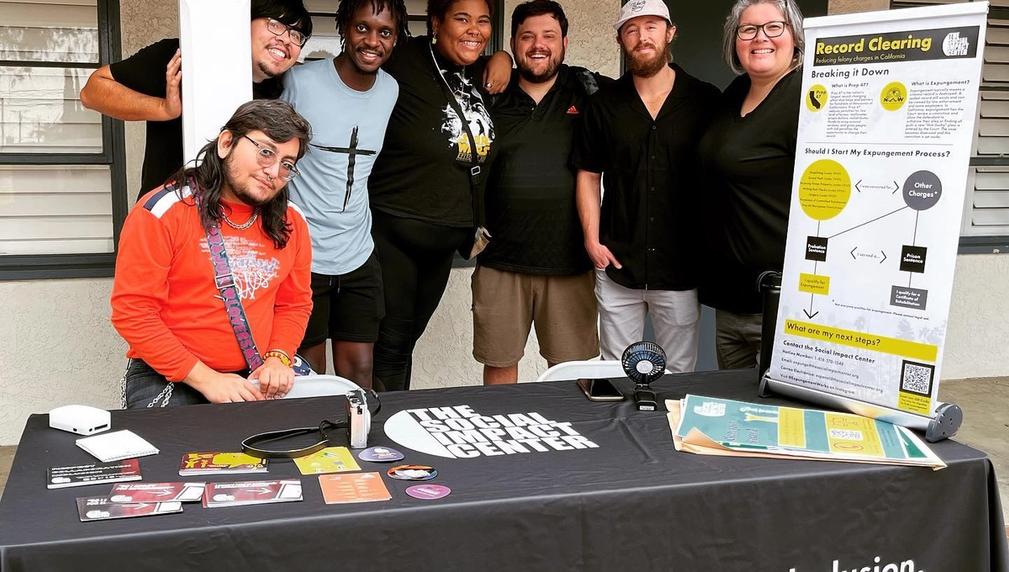Breaking Down Barriers, Building New Stories
Led by systems-impacted community, Social Impact Center seeks to break down barriers to freer, more secure and hopeful futures as Angelenos navigate life post-incarceration. We break down the most visible barriers by helping clear, seal and expunge 1000s of records, a starting point to new opportunity. But that's just step 1: with Mindology, we offer the emotional tools to manage the emotional ups and downs of re-entry, and are building new film career pipelines and generative opportunities to allow bigger dreams to flourish into reality.

What is the primary issue area that your application will impact?
Opportunities for People Who Have Been Incarcerated
In which areas of Los Angeles will you be directly working?
Central LA
East LA
San Fernando Valley
South LA
In what stage of innovation is this project, program, or initiative?
Expand existing project, program, or initiative
What is your understanding of the issue that you are seeking to address?
A criminal record represents 29,000+ barriers to jobs, housing, licensing and more. While Prop 64, 47, and other shifts reducing racist drug and other laws, or AB 731 (2022) allowing sealing felony records, California's attempts to clear or seal records automatically have fallen short, often requiring lengthy court paperwork. Bureaucratic stagnation, lack of outreach, and formerly-incarcerated people's need to focus on survival all contribute to keeping legal records blocking the success of tens of thousands of Angelenos. Beyond a record, thousands of formerly-incarcerated people were forced out of the job and skills-building opportunities while in prison, face employer stigmas when out,and carry mental traumas of incarceration and from being raised in disinvested communities. All these barriers stand in the way of formerly-incarcerated people holding on to good jobs, housing and hope, and to contributing to their households and communities in the ways they have long dreamed.
Describe the project, program, or initiative this grant will support to address the issue.
Expungement and Record Clearing: SIC runs quarterly outreach clinics at trusted neighborhood sites in South, East, and SF Valley. Expungement events offer participants the opportunity to expunge, reclassify, or seal records, and we also offer rap sheets with volunteers. This includes a community-run narrative workshop for new AB 731 petition process. We also have an online intake service for expungement services, weekly bilingual hotline, and share basic education on expungement for dozens of our partner organizations. Mindology Fitness: The Mindology mental health 3-month workshop was created by systems-impacted clinical psychologist Dr. Troy Beyer and tested by our org both in prisons and with formerly-incarcerated people. The training focuses on self-regulation unique stress-relief techniques (including those used by military/medical personnel), effective problem solving, emotional pain relief and goal setting. We will be offering a 101 and 201 course, as well as training certification so that FI participants can offer the course themselves (in future paid work). Film Careers Pipeline: SIC is launching a new film production pipeline, offering FI participants trained employment opportunities as Production Assistants (PAs). These include specific training on the different aspects of production, and commitment to hire for the duration of film projects (1-2 years) contingent upon participation in a Mindology and regular monthly check ins with off-site mentorship group.
Describe how Los Angeles County will be different if your work is successful.
Removing the barrier of a legal record allows thousands of formerly-incarcerated (FI) Angelenos to go from immediate survival, to dream more freely and to seek better housing, job, loan, licensing, and educational opportunities. We will directly support these pursuits in creative careers, but also plan to build cooperative and other value-creating opportunities. This will be enhanced by Mindology trainings that offer FI Angelenos tools to navigate past violence/trauma and the deep stress of re-entry, while seeing oneself as positive protagonists in life. These techniques will support residents from disinvested communities in San Fernando Valley to South LA to more freely succeed as creators, caretakers, parents/guardians, mentors, and community leaders. We are building an LA where FI people have the chance to not just make sense of, tell and direct their own life stories, but gain the freedom to dream more expansively and shape more vibrant, supportive futures for all communities.
What evidence do you have that this project, program, or initiative is or will be successful, and how will you define and measure success?
As an organization, our trauma-informed intake provides a baseline to measure success via annual follow up calls, asking about changes in housing, employment, stability, and legal record status. Of the more than 1,000 people we served in 2021-2022, we found consistent improvement in immediate food/income security, regular shelter, and participation in a long-term supportive community organization that include mental health or education. Based on feedback, we also add different service partnerships or programs, which is how our job training program arose. For Mindology, we offer each participant trauma-informed check ins every 6 months. Participants self-evaluate how tools like self-regulation are being put in place and how clients feel progress to the personal goals set. For career training, success will mean retention in this first film projects and later in high-road creative work. Participants will be paired with FI mentors and meet regularly as a training cohort to support success.
Approximately how many people will be impacted by this project, program, or initiative?
Direct Impact: 905
Indirect Impact: 7,000